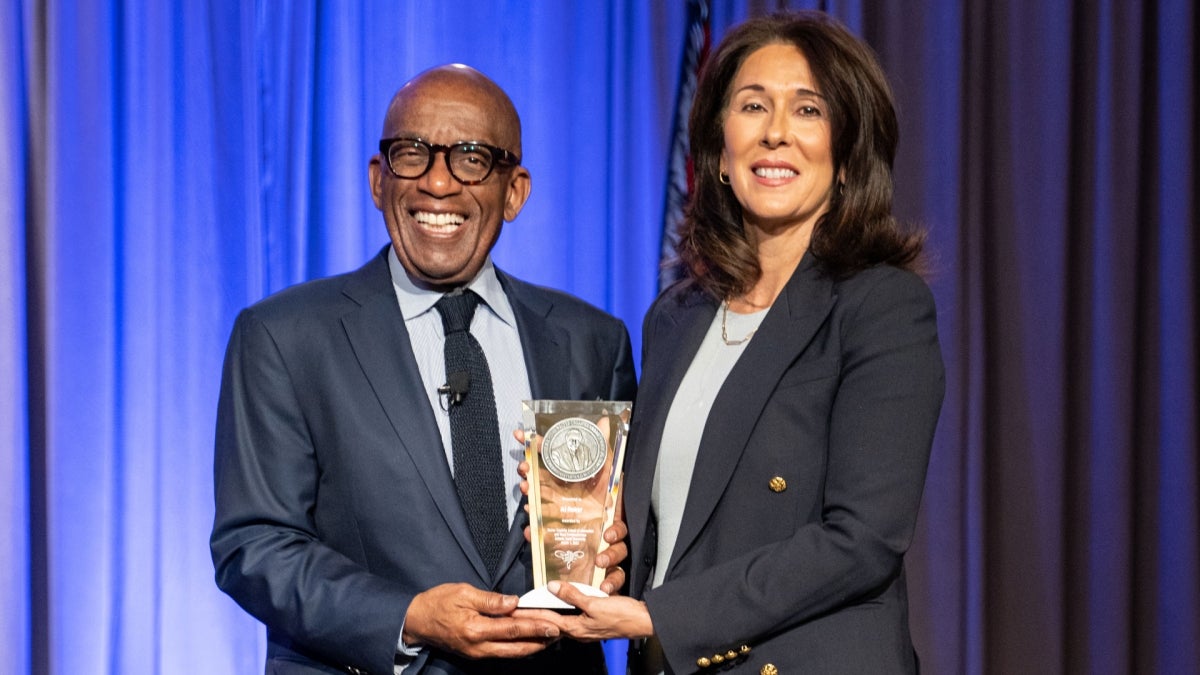Al Roker, the Emmy Award-winning weatherman and popular anchor for NBC News’ "Today," reflected on his career, his experiences with racism in the newsroom and the continued evolution of journalism and weathercasting as he accepted the 38th annual Walter Cronkite Award for Excellence in Journalism presented by Arizona State University’s Walter Cronkite School of Journalism and Mass Communication.
ASU Executive Vice President and University Provost Nancy Gonzales presented Roker with the award Tuesday in front of 900 supporters at the first in-person awards luncheon since 2019.
During an acceptance speech filled with humor, Roker recalled his time as a child watching Walter Cronkite on "CBS Evening News," as well as other influences such as Chet Huntley, David Brinkley and Frank Reynolds.
“It was a time when a newscast and its anchor could sway opinion without giving an opinion,” Roker said.
The ceremony featured the first ever Cronkite Award Red Carpet Show hosted on YouTube by Cronkite School students Ivory Ward and Evan Lis, with special guest appearances from ABC News senior national affairs correspondent (and Roker’s wife) Deborah Roberts, as well as Cronkite Award Luncheon co-chairs John Schurz and Christine Dotts.
MORE: Al Roker encourages journalism students to remain open-minded as they navigate college, career
The luncheon also featured the official launching of the Cronkite School’s new brand elevation campaign, #CronkiteGlobal. The initiative will aim to amplify the school's existing Cronkite Global Initiatives programs, connect with the school’s 14,000 alums and promote its newest program, CronkitePro, which will address the training needs of journalism and communications professionals, and their companies.
#CronkiteGlobal also includes the Cronkite Pledge, which calls on journalists, communicators and students to uphold their shared values and give power to those who seek to become advocates and more connected to the world.
The Cronkite School also recognized the first-place winners of 2020–21 Shaufler Prize in Journalism: Toluse Olorunnipa and Griff Witte of The Washington Post.
Roker reminisced on the start of his television news career, which began in 1974 when he worked as a weathercaster in Syracuse, New York, while he was still a sophomore at the State University of New York at Oswego.
After graduating from SUNY Oswego, he moved to Washington, D.C., where he met “Today” show weathercaster Willard Scott, whom he described as the man who would have “the most profound influence” on his career.
“He told me to always be yourself. No matter what anyone does or says, nobody can take that from you. And no matter how successful you are at other jobs, never forget your day job,” he said.
He was the first Black weathercaster in each of the cities where he worked until he moved to New York City in 1983, he said.
Roker described his experiences with racism, including a time when a local news anchor made a racist comment to him after the anchor was accosted by a homeless person.
“As you climb the ladder, you run into obstacles. Like racism. Some overt, some subtle — some so crazy, you almost have to laugh,” he said.
Roker praised Black television pioneers such as Bob Teague, Bill McCreary, Carol Jenkins and Melba Tolliver, as well as some current network executives of color including Cesar Conde, chairman of NBCUniversal News Group; Kim Godwin, president of ABC News; and Rashida Jones, president of MSNBC. He emphasized the need for more diverse leadership in journalism.
“Those decisions are made in the front offices, and the only way change gets made is when there is change in those very front offices,” he said.
Roker ended his speech by describing the evolution of journalism and weathercasting, and how increased technology has challenged journalists to adapt to the changing needs of the audience.
He called on reporters to be “truth tellers” while borrowing a famous line that Cronkite used on his newscasts.
“The challenges are there. Are we up to those challenges? I say we are. We have to be,” he said. “Because, ladies and gentleman, that’s the way it is.”
All of the funds raised from the luncheon support the Cronkite Award for Excellence in Journalism fund, which supports future generations of journalism and media professionals.
Top photo: Al Roker and ASU Executive Vice President and University Provost Nancy Gonzales hold the Cronkite Award on Tuesday. Photo by Sun Belous
More Law, journalism and politics

Arizona secretary of state encourages students to vote
Arizona Secretary of State Adrian Fontes looked right and left, taking in the more than 100 students who gathered to hear him speak in room 103 of Wilson Hall.He then told the students in the Intro…

Peace advocate Bernice A. King to speak at ASU in October
Bernice A. King is committed to creating a more peaceful, just and humane world through nonviolent social change.“We cannot afford as normal the presence of injustice, inhumanity and violence,…

CNN’s Wolf Blitzer to receive 41st Walter Cronkite Award for Excellence in Journalism
Wolf Blitzer, the longtime CNN journalist and anchor of “The Situation Room With Wolf Blitzer,” will accept the 41st Walter Cronkite Award for Excellence in Journalism, Arizona State University has…
